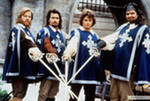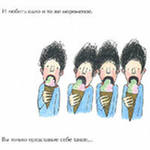- Учителю
- Research work « Magic numbers in Russian and English proverbs» (Comparative analysis of the use of the numerals one and seven in Russian and English proverbs)
Research work « Magic numbers in Russian and English proverbs» (Comparative analysis of the use of the numerals one and seven in Russian and English proverbs)
Ministry of Education of the Republic of Bashkortostan
Secondary School № 2 Baymak
The Republic of Bashkortostan
Research work
« Magic numbers in Russian and English proverbs»
(Comparative analysis of the use of the numerals "one" and "seven"
in Russian and English proverbs)
Section: Linguistics, foreign languages
Sabina Buribaeva, form7
School №2, Baymak
Scientific adviser:
A.A.Syrlybaeva, a teacher of English
School №2, Baymak
«Moral proverbs are wonderfully useful in cases when we are away from you a little that we can invent to justify ourselves»
Alexander Pushkin

Один в поле не воин.

You cannot have your cake and eat it.
The object of the study are Russian and English proverbs and sayings that contain numerals. The numbers "one", "seven" and their derivatives, occurring in these phraseological units, are the subject of research.
The purpose of my work:
To disclose of the use patterns of numerals one and seven in the folklore of Russian and English languages.
To achieve this goal I`ve put the following tasks:
- to get acquainted with Russian and English proverbs and sayings, in which there are numbers "one" and "seven";
- to transfer of data to follow characteristics of proverbs;
- to analyze and summarize the findings;
-to make up a list of Russian proverbs with these figures and the corresponding English equivalents.
The material for observation served as reference books, dictionaries and collections of phraseological units (proverbs and sayings) of the two languages.
Introduction
Proverbs and sayings are stored in language nuggets of folk wisdom. They reflect the history and outlook of the people who created them, their traditions, customs, habits, and a healthy sense of humor.
In each of the languages of the world there are hundreds of proverbs and sayings that are created by many generations of people who have developed and perfected over the centuries.
Knowledge of proverbs and sayings enriches vocabulary, helps to absorb the imagery of language, attaches to popular wisdom. Many of these gems of folk wisdom are international, they may have a different sound, they might use different words, but their meaning remains the same.
Russian is especially rich in proverbs and sayings . You just remember how often we hear them from the lips of our grandmothers. Almost every action they pick your comment in the form of proverbs, and they say it is not just. In the folk sayings reflected practical philosophy, thinking instructive conclusions. Perhaps if we had often listened to him, many errors and ridiculous situations in our lives could have changed. And not only my grandmother. We often hear sayings in everyday life, but usually do not notice it, or simply do not focus our attention on this. But everything always turns out exactly like the proverbial. These sayings, like axioms, accurate, truthful, and do not require proof, but if anyone wants to argue with that, he can do anything contrary to the adage, let's see what happens.
One day at school in the classroom work, we were given a task to do applique of colored paper. I somehow found a few sheets of paper and began to carve figures. My grandmother recalled: "Measure twice, cut once." I nodded and quickly began to cut. Due to the fact that I cut quickly figure turned curves and application failed, and my work failed, I crumpled up and threw it away. Colorful paper left, and looked at my watch, I realized long ago that the shops are closed. And as a result, a deuce for the outstanding work. Whatever you say, and my grandmother is as always right. Then, looking at the two in a diary, his grandmother's words sounded in my head for a long time. And I thought, maybe it's worth more likely to listen to them, and began to remember the words of my grandmother.
Numbers have always played a huge role in the lives of all peoples of the world. The symbolic value of numbers have survived almost in their original form. Despite the fact that our society is growing rapidly, and at the XXI century, the idea of some numbers as of something unexplored, magical and mysterious preserved in the minds of almost everyone, regardless of culture and traditions of his country. This in turn led to the frequency of use of numbers in the works of folklore.
"What a luxury, what's the point in each of our saying! What the gold!"Pushkin said.
Maybe this is purely my opinion, but I think that the richest proverbs and sayings, that is in the Russian language. After all, the territory of Russia is home to more than a hundred and fifty nationalities, immigrants from the former Soviet republics, immigrants from near and far abroad. The wisdom of all these people is woven together and expressed in proverbs and sayings. They braided love for the Motherland, courage, courage, faith in justice. Perhaps they help Russian survive no matter what.
And so, what is the proverbs, and how do they differ? Dahl wrote: "Proverb - A brief parable ..." Proverb is a brief wise saying, has an instructive meaning, encompasses a complete thought, worldly wisdom. The adage is different from the proverb that it is a part of the judgment, is a bright, well-aimed popular expression.
There are countless topics about proverbs and sayings. They speak about the teachings, knowledge, family, diligence and skill of human qualities, advantages and disadvantages.
As a rule, they are not only direct but also figuratively, and it is most often used figuratively. Take, for example, the well-known proverb: "Without work, and not pull the fish from the pond." It's saying is not about fishing, but really, for what would have to catch a fish, will have to make quite a few efforts, but still proverb has a broader meaning, and teach us that in order to get a result, you must make a lot of effort, in any case, no matter how simple it may seem.
Proverbs with the numeral "one"
 All for one and one for all .
All for one and one for all .
One of our kind. 
 One
apple a day keeps
One
apple a day keeps
a doctor away.
The values use the number "one" in proverbs.
1 The juxtaposition of "one - a lot" or "one - another"
Лучше один раз увидеть, чем сто раз услышать. Seeing is believing.
2. The juxtaposition of one man (the subject, the quality of) the whole unity (one - is not enough, not enough)
Один в поле не воин. One man is no man.
3. "One" - as an indicator of the frequency
Один раз соврешь - другой не поверят. Once a liar, always a liar.
Proverbs with the numeral "seven"
God created the world in 6 days, to devote the seventh rest. Rome is built on seven hills.
The Greeks recognized seven sages and the 7 Wonders of the World. The temples were 7 stages and they covered seven candles.
In tsarist Russia the number 7 was used in witchcraft and spells.
The 7 rainbow colors.

-
The values use the number "seven" in proverbs.
1.The juxtaposition of the seven, that is, one (whole society)
Семеро одного не ждут. For one that is missing there's no spoiling a wedding.
2. When many people are taking up one thing, it fails
У семи нянек дитя без глазу. Too many cooks spoil the broth.
3. Seven as a large number, a long period of time
Работать до седьмого пота. Give a wet shirt.
But during the research work we came across the following difficulties:
Many proverbs and sayings are easily translated into Russian; others require an explanation, since on the contrary, have nothing to do with our Russian expressions.
In the English sentence can never be two negations. The Russian language is flexible, and it allows you to save the English word order in the sentence, but not always.
It turned out that proverbs can be classified into the following groups:
1. English proverbs and sayings that are equally fully translated into Russian. For example:
Одна ласточка не делает весны. One swallow does not make a summer. In this case, the English version fully corresponds to Russian.
2. English proverbs that are equally fully translated into Russian, but there is no equivalent of the appropriate number. For example, in the English proverb "Be born with a silver spoon in one's mouth", "One law for the rich and another for the poor", we see the word "one", and in the Russian equivalent of the word "one" is not "«Родиться с серебряной ложкой во рту», «Закон что дышло: куда повернул, туда и вышло».
3. English proverbs and sayings that are partially translated into the Russian language the same way, English version is slightly different from the Russian. At the same value of a mismatch of English proverbs and sayings in their translation into Russian, but called the number saved. For example, the English proverb "A bird in the hand is worth two in the bush" is the literal translation of "Better a bird in hand is worth two in the bush." It corresponds to the Russian proverb, «Лучше одна птичка в руках, чем две в кустах». Ей соответствует русская пословица «Лучше синица в руках, чем журавль в небе» («Не сули журавля в небе, а дай синицу в руки»). Another example: the English proverb "To kill two birds with one stone" (the literal translation of "kill two birds with one stone") has a corresponding counterpart in the Russian language «Убить двух птиц одним камнем» , убить двух зайцев одним выстрелом.
4. English proverbs and sayings that have no counterpart in the Russian language. For example, saying "Cry with one eye and laugh with the other" (the literal translation of "Одним глазом плакать, а другим смеяться") has the meaning of "being two-faced." Analyzing English and Russian proverbs by comparing them with each other, and it became clear that they are characterized by variability in the same language and different. There are many phraseology - synonym with a very close subject-logical content, indicating the same concept or concepts are very close to each other, for example, the English proverb "As like as two peas", "Be like as two eggs" corresponds to the Russian proverb "Похожи как две капли воды"
It follows that, as a rule, not the word, and the individual values may be synonymous in relation to one another. This study revealed that the proverbs in English and Russian languages have certain expressive and artistic features.
Conclusion.
So, as a result of this work, we have come to the following final conclusions:
1) In the phraseologisms of the two languages the same symbolic numbers are used.
2) In the Russian language, these numbers are used more often than in English.
3) The presence of numbers does not complicate the interpretation of proverbs, on the contrary, makes them more impressive and imaginative.
4) Use the same numbers in the proverbs of the two languages is not associated with any magic or secret.
5) The main components of the numerical value of the use of "one" and "seven" in Russian and English saying the following:
a) One - it is small and insufficient, and seven or much good.
b) If a lot of people engaged in the same business, it may fail.
c) Unity is power.
Literature:
1) Маргулис А., Холодная А. Русско-английский словарь пословиц и поговорок | Russian-EnglishDictionaryofProverbsandSayings.- McFarland amp Company, Inc., Publishers Jefferson, North Carolina, and London, 2000.- С. 487.
2) интерент ресурс translate.academic.ru/</</font>
3)Кунин А.В. Англо-русский фразеологический словарь/Лит.ред.Литвинова.-4-е изд., перераб. и доп.-М. Рус. Яз., 1984 - С. 944.
4) Даль В.И. Пословицы русского народа. М.: Эксмо, - 2006. - С. 616.
5) Кузьмин С.С., Шадрин Н.Л. Русско-английский словарь пословиц и поговорок: 500 единиц. - Спб.: МИК/ Лань, 1996. - С. 352.